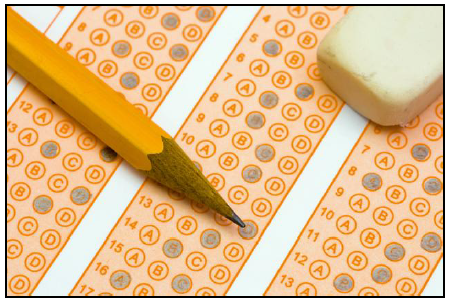Introduction
A key factor associated with academic success and dropout prevention is parent involvement. In order to help parents and students succeed in school, Cooperative Extension offers the Together for a Better Education program. The program brings together partners from high schools, local colleges, families of 9-12th grade students, college-age mentors, local nonprofits and UNCE staff. The program consists of six sessions held in English and Spanish in various locations across Las Vegas. This fact sheet provides an overview of Session 3: Knowing the School System: Standards and Testing.
Testing and the Grading System
It is important for parents to understand the testing and grading system in order to help their child prepare and provide support.

Which tests and classes are required in high school?
- Students enrolled in courses where end-of-semester tests are required shall take the appropriate final exams.
- Some students in grade 12 participate in the National Assessment of Educational Progress (NAEP).
- Students in grade 11 take the Nevada Alternate Assessments (NAA).
- Students in grades 10-12 are administered the Nevada High School Proficiency Examinations (NHSPE).
- The Language Assessment Scale (LAS) Links 2000 initial placement assessment is administered to all language minority students within 30 calendar days of enrollment.
- All students identified as limited English proficient must be annually assessed (K-12) to determine progress and level of English language proficiency.
Common Core Standards
The Common Core Standards were adopted by the Nevada Department of Education in October 2010 and all of the assessments will be aligned with them. The new standards are designed to be relevant to the real world and are designed to prepare students for success in college and careers. For more information go to: Common Core.
In high school, students receive report cards with grades, and these grades are converted to a Grade Point Average (GPA) based on a 4.0 system.
A = 4.0 B = 3.0 C = 2.0 D = 1.0 F = 0.0
It is important to maintain a high GPA because starting in 9th grade, the GPA begins to count toward the pursuit of an advanced diploma, college admissions and scholarships. A student should maintain a minimum of a 3.0 GPA.
Graduation Requirement: Courses of Study and Credits
The State Board of Education requires students to meet the following graduation requirements in addition to course requirements:
- Students must demonstrate proficiency in Reading, Math, Science and Writing through the Nevada High School Proficiency Examinations (NHSPE).

21st Century Course of Study
The Clark County School District (CCSD) expects all students to meet the requirements of the 21st Century Course of Study. The 21st Century Course of Study is designed to prepare all students for the following post-secondary opportunities:
- University/Four-Year College
- Community/Two-Year College
- Trade/Technical School
- Workforce
In addition, it meets Nevada System of Higher Education (NSHE) University Admissions Grade Point Average (GPA) and Core Curriculum Requirements including:
- 3.00 GPA (weighted or unweighted) in the core curriculum
- Approved NSHE Core Curriculum Requirements (4 English, 3 Math – including Algebra II, 3 Natural Science, 3 Social Science & History = 13 units)
- Prepare students for the State of Nevada Millennium Scholarship GPA and Core Curriculum Requirements including:
- 3.25 cumulative GPA
- Approved NSHE Core Curriculum Requirements (4 English, 4 Math – including Algebra II, 3 Natural Science, 3 Social
Students may also choose to earn an advanced honors diploma by taking additional classes such as honors courses and/or Advanced Placement (AP) courses.
Admission Requirements
Students may apply to any college or university they wish to attend. The information below provides the requirements for the two major universities and the state college in Nevada.
University of Nevada, Reno and University of Nevada, Las Vegas:
- 3.0 GPA in the Core Curriculum (4 English, 3 Math – including Algebra II, 3 Natural Science, 3 Social Science & History – 13 units)
- ACT OR SAT
For more information go to: UNR or UNLV
Nevada State College
- 2.0 GPA in the Core Curriculum (4 English, 3 Math – including Algebra II, 3 Natural Science, 3 Social Science & History – 13 units)
- ACT OR SAT
For more information go to NSC
Admission requirements vary depending on whether students are freshmen, international or transferring. Also, students applying with lower ACT or SAT scores may be provisionally admitted and required to enroll in remedial classes. It is important for students to thoroughly review the admissions requirements at each institution and speak to an admissions counselor.

Source: North Carolina Cooperative Extension. Together for a Better Education Facilitator Manual.
To learn more about this topic and “Together for a Better Education” contact: Nora Luna at (702) 940-5420 or email.

Funded by the U.S. Department of Education and brought to you by the Nevada System of Higher Education (NSHE)


